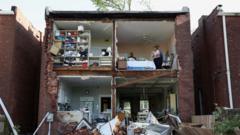A devastating landslide at the Kiteezi dump in Kampala, Uganda, has claimed 30 lives, including that of a young rubbish collector's best friend. Amid ongoing blame-shifting between city and central governments, the tragedy underscores deep-rooted issues in waste management, safety protocols, and urgent need for infrastructural reforms.
The Tragedy of Kiteezi: Lives Lost Amidst a Waste Crisis in Kampala

The Tragedy of Kiteezi: Lives Lost Amidst a Waste Crisis in Kampala
As rubbish collectors face deadly hazards at Kampala's Kiteezi dump, the authorities grapple with negligence and systemic failure following a tragic landslide.
Article Text:
In the heart of Uganda's capital, Kampala, a tragic incident at the Kiteezi dump has revealed the perilous conditions facing rubbish collectors. Okuku Prince, a 22-year-old collector, recalls the heart-wrenching discovery of his best friend, Sanya Kezia, whose life was cut short when a landslide swept through the massive rubbish dump last August, claiming 30 victims in total. "I think some people are still underneath the garbage," he emotionally asserts, citing the ongoing danger that haunts the area.
Many who inhabit this precarious environment make a living by scavenging valuable remnants from the refuse, whether it be fishing nets, plastic, or other recyclables. In the aftermath of the collapse, a blame-game ensued between Kampala's city council and the central government, with accusations of negligence ringing hollow for the families who mourn without the dignity of a proper burial for their loved ones. Kezia's body was eventually recovered with visible injuries, leaving Prince disturbed by the gruesome reality of their work.
"Houses were lost during rescue efforts," Prince remarks, revealing another layer of crisis as he now grapples with new living arrangements far from the dump. "I used to make 10,000 shillings a day [around $2.70] here, but now the landscape has changed drastically," he adds, emphasizing the financial instability that accompanies this tragic event in an already struggling economy marked by record youth unemployment.
While compensation has been promised to the families of the deceased, the local authorities admit that around 200 families, displaced by the collapse, have received no aid. Dr. Sarah Karen Zalwango, the Kampala Capital City Authority (KCCA) public health head, noted they are still waiting for budget allocation for these victims.
Urban planner Frank Muramuzi warns that the collapse was foreseeable; a lack of strategic waste management decision-making is to blame. The Kiteezi dump, operational since 1996, was built to accommodate the waste of a city now populated by over four million residents, generating around 2,500 tonnes of waste daily. Unfortunately, the site lacks necessary infrastructure for recycling and waste processing, leading to hazardous conditions.
Muramuzi explains that without proper maintenance and periodic audits, the landfill becomes increasingly fragile. "Trapped gases from decaying waste weaken the structure," he observes, urging the government to prioritize sustainable waste management practices to prevent future tragedies.
Despite the clear solutions, political struggles and financial mismanagement continue to stymie the efforts for change. KCCA Mayor Erias Lukwago highlights the challenges posed by limited funding, with $9.7 million needed to decommission the Kiteezi site. "Adequate funding from the central government could have propelled us further," he laments, as development partners provide sporadic support.
The government has offered families $1,350 for their losses, but has withheld further payment pending responsibility findings—a strategy perceived as inadequate by the grieving community. In the wake of the disaster, President Yoweri Museveni dismissed several KCCA officials after a critical report criticized the response and management of waste.
In a bid to avert future disasters, the city is now drafting initiatives to convert organic waste into compost. Solid waste officer James Bond Kunobere expresses hope for improving public awareness about waste separation, stating, “If you don’t change the mindset, all waste heads to the landfill.”
Yet, for those like Prince, these measures feel too slow in coming. "Promises of compensation evaporate; sorrow remains," he states, encapsulating the pain and urgency for reform that so many in Kampala endure. The Kiteezi tragedy is not merely a statistic; it is a chilling reminder of the human cost behind inadequate urban planning and waste management in Uganda.
In the heart of Uganda's capital, Kampala, a tragic incident at the Kiteezi dump has revealed the perilous conditions facing rubbish collectors. Okuku Prince, a 22-year-old collector, recalls the heart-wrenching discovery of his best friend, Sanya Kezia, whose life was cut short when a landslide swept through the massive rubbish dump last August, claiming 30 victims in total. "I think some people are still underneath the garbage," he emotionally asserts, citing the ongoing danger that haunts the area.
Many who inhabit this precarious environment make a living by scavenging valuable remnants from the refuse, whether it be fishing nets, plastic, or other recyclables. In the aftermath of the collapse, a blame-game ensued between Kampala's city council and the central government, with accusations of negligence ringing hollow for the families who mourn without the dignity of a proper burial for their loved ones. Kezia's body was eventually recovered with visible injuries, leaving Prince disturbed by the gruesome reality of their work.
"Houses were lost during rescue efforts," Prince remarks, revealing another layer of crisis as he now grapples with new living arrangements far from the dump. "I used to make 10,000 shillings a day [around $2.70] here, but now the landscape has changed drastically," he adds, emphasizing the financial instability that accompanies this tragic event in an already struggling economy marked by record youth unemployment.
While compensation has been promised to the families of the deceased, the local authorities admit that around 200 families, displaced by the collapse, have received no aid. Dr. Sarah Karen Zalwango, the Kampala Capital City Authority (KCCA) public health head, noted they are still waiting for budget allocation for these victims.
Urban planner Frank Muramuzi warns that the collapse was foreseeable; a lack of strategic waste management decision-making is to blame. The Kiteezi dump, operational since 1996, was built to accommodate the waste of a city now populated by over four million residents, generating around 2,500 tonnes of waste daily. Unfortunately, the site lacks necessary infrastructure for recycling and waste processing, leading to hazardous conditions.
Muramuzi explains that without proper maintenance and periodic audits, the landfill becomes increasingly fragile. "Trapped gases from decaying waste weaken the structure," he observes, urging the government to prioritize sustainable waste management practices to prevent future tragedies.
Despite the clear solutions, political struggles and financial mismanagement continue to stymie the efforts for change. KCCA Mayor Erias Lukwago highlights the challenges posed by limited funding, with $9.7 million needed to decommission the Kiteezi site. "Adequate funding from the central government could have propelled us further," he laments, as development partners provide sporadic support.
The government has offered families $1,350 for their losses, but has withheld further payment pending responsibility findings—a strategy perceived as inadequate by the grieving community. In the wake of the disaster, President Yoweri Museveni dismissed several KCCA officials after a critical report criticized the response and management of waste.
In a bid to avert future disasters, the city is now drafting initiatives to convert organic waste into compost. Solid waste officer James Bond Kunobere expresses hope for improving public awareness about waste separation, stating, “If you don’t change the mindset, all waste heads to the landfill.”
Yet, for those like Prince, these measures feel too slow in coming. "Promises of compensation evaporate; sorrow remains," he states, encapsulating the pain and urgency for reform that so many in Kampala endure. The Kiteezi tragedy is not merely a statistic; it is a chilling reminder of the human cost behind inadequate urban planning and waste management in Uganda.






















